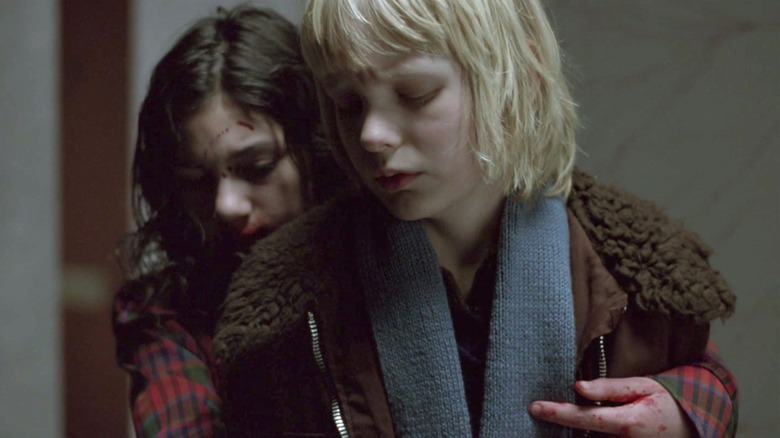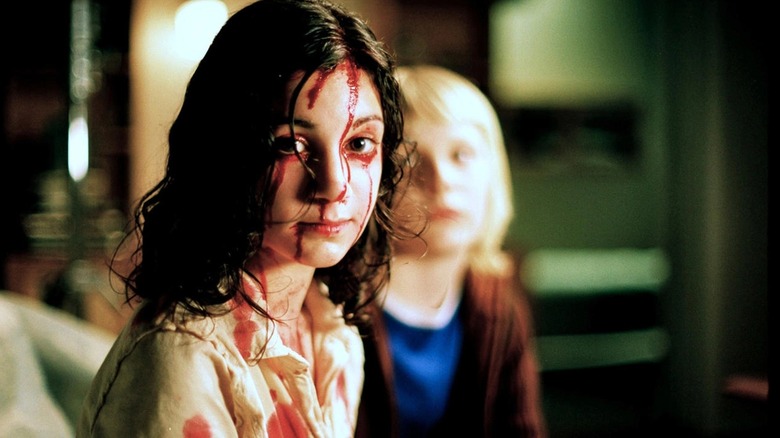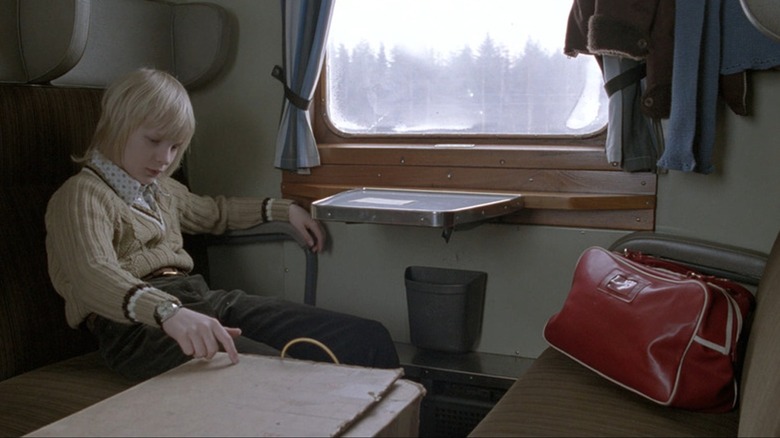The Brilliant 2008 Vampire Horror Movie John Carpenter Absolutely Loves
There's an extremely strong case to be made in favor of John Carpenter being dubbed the master of horror. Although 2010's "The Ward" was Carpenter's last feature film foray into the genre (along with producing the "Halloween" reboot trilogy), the director's diverse oeuvre is profound enough to sustain us for the ages. Sure, every horror-head would love for Carpenter to helm another project, but for now, all we can do is cherish what we have and hope for the best. In the meantime, we can also talk about an underrated horror gem that Carpenter absolutely adores.
When asked about contemporary horror and its ability to scare him, Carpenter told Comic Book that it is hard for him to distance himself from the lens of a filmmaker while watching them, and scrutinize "the plumbing" of modern horror. However, Carpenter considers a film scary if it is able to bypass these instincts and accomplish something new and interesting:
"No, I see the plumbing. You have to be young, young is good, and know a little less [to get scared]. But when a movie does affect me, that means it's great because it's gotten past all my sensors [...] There was a movie a few years ago I thought was just fabulous. It was called 'Let the Right One In'. I believe that was a Swedish film. Oh, man, that was terrific. Just terrific. It just reinvented the vampire myth quite a bit. And I liked it."
2008's "Let the Right One In" is not just a competent adaptation of John Ajvide Lindqvist's novel of the same name, but an unconventional, visceral treatment of the vampire genre in film. Tomas Alfredson's handling of the subject matter — which is both tender and repulsive, comforting and disturbing — elevates this beautifully shot drama into something discomfitingly beautiful.
Let The Right One In isn't scared of embracing bleakness
The suburbs of 1980s Stockholm are covered in blankets of snow, which induce a suffocating sheet of grimness from start to finish. A young boy, Oskar (Kåre Hedebrant) is consumed by revenge after being bullied incessantly at school, acting out make-believe scenarios of murder after being wronged by his peers. Amid this seemingly humdrum existence, where the very essence of life feels muted, Oskar meets Eli (Lina Leandersson), a mysterious youth taken care of by the older Håkan (Per Ragnar). Oskar is drawn to Eli's presence, and the two bond over their mutual darkness, while Håkan is seen violently killing passersby to sustain his weakened ward. Eli is a creature of the night — a vampire who needs to sustain themselves on human blood — and this inherent kernel of violence emerges as an uncomfortable truth that is an inseparable aspect of Eli's existence.
Eli is doomed to mire in isolation even after finding tenderness, as every person who loves them will succumb to old age and disintegration every single time, forever. With Eli defying traditional notions of gender, "Let The Right One In" blooms as a queer love story drenched in vivid shades of red, as the act of loving itself is intimately connected with the consumption of another. Both Håkan and Oskar are two sides of the same coin: the former has now grown old, disposable to the immortal Eli, unable to fulfill the roles of provider and love any longer. Meanwhile, Oskar, who chooses to indulge in violence for self-preservation, begins to assume Håkan's role, blurring the concepts connected with morality, whose definition changes in such a dreary, melancholic world.
Let The Right One In redefines monstrosity
The vampire myth introduces intriguing definitions of morality, as their parasitic existence is a prerequisite for survival, instead of a violent instinct for the sake of it. The two can obviously overlap, with the existence of vampires who transform the act of feeding into a celebration of hedonism or gross assertion of power. Eli doesn't necessarily revel in this violence, but the brutality of the act feels like a fact divorced from remorse: there is no space to moralize their kills, as it is an instinct as natural as having to breathe air. However, Eli does stop themselves from harming Oskar when the latter slits his wrist to offer blood — an act of love both dangerous and selfless — as they have grown to care about Oskar, and choose to not harm him.
Although the film situates Oskar as the moral anchor at first, this perspective shifts when Eli and Oskar's hearts align, and the two function as a unit against those foolish enough to mess with them. Their actions are neither romanticized nor condemned, as they do whatever feels necessary to ensure survival, including the turning of a teenager into a vampire who bursts into flames. Oskar's violence stems from loneliness and disenfranchisement, emboldened by Eli's status as immortal guardian, who dismembers every bully intent on snuffing out Oskar's autonomy and existence. Realizing they're not safe in a space where childhood is not sacred, they flee, in search of a shared dream that can sustain them as long as possible — at least until Oskar is alive.
Oskar might be doomed to share Håkan's fate, but to live a life doused in visceral love might just be the play in such a treacherous world. The key is to let the right one in.


